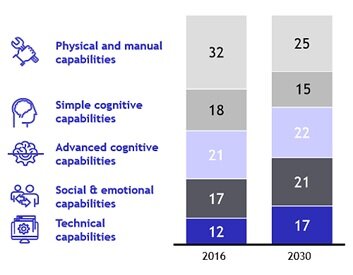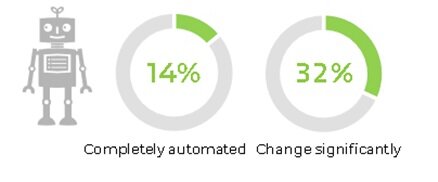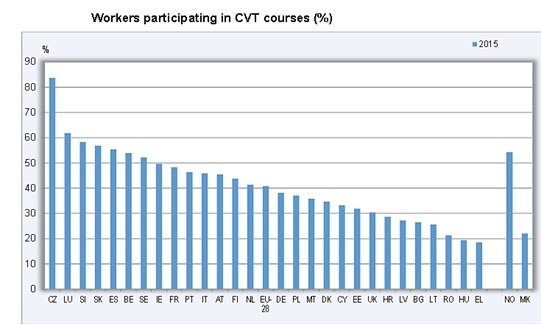About the project
Find about CVETNET and its value to the EU community. It is essential for the Project to show the main topics on which CVETNET is based in order to reach all those interested groups or individuals in disseminating and adopting the initiative.
CVETNET's Background
Challenges brought by digital transformation of companies, societies, daily life and the new generations at workplace must be urgently addressed by companies in order to successfully adapt to change. Human resources, particularly SMEs, from the management to every employee will have to update skills in workplace. Thus, CVET should offer new individual learning pathways.
EXPECTED NEW SKILLS AND CAPABILITIES REQUIRED IN THE FUTURE

SOURCE: MCKINSEY ON BEHALF OF WKO (2019): "FORESIGHT BILDUNG DER ZUKUNFT 2030 AUTOMATION"
More than 40 % of the jobs in Europe will dramatically change due to digitalisation. The irruption of Big Data and Algorithms will produce automation in many jobs leading to great changes in workforce skills needs. 12% of all jobs are threatened by automation. WKÖ Study “Foresight Bildung der Zukunft 2030”, foresees that by 2030> 50% more technological and> 25% more social and emotional skills will be needed and there is a considerable need for digital skills in all professions.
LABOUR MARKET CHANGES IN EU

SOURCE: THE FUTURE OF WORK IN FIGURES, OECDE. 2019
To face these current events, VET (vocational educational and training) will require adapting to labour market needs, and CVET (continuous vocational educational and training) will become crucial to face new challenges at their workplaces through the reskill and upskill workers for their jobs or future jobs. Nevertheless, the role of CVET in VET systems is still considered a secondary priority in VET policy and in most of EU countries CVET is under represented.

SOURCE: ON THE WAY TO 2020: DATA FOR VOCATIONAL EDUCATION AND TRAINING POLICIES, CEDEFOP (https://www.cedefop.europa.eu/files/5576_en.pdf)
The project CVETNET aims at building capacity of CVET providers networks and its members in order to better adapt their organizations and trainers in supporting SMEs to reskill and upskill their managers and employees on intergenerational learning and adaptation to digital transformation.
The Project
The project CVETNET is a European project co-funded by Erasmus+ Programme and it aims at building capacity of CVET provider’s networks and its members in order to better adapt their organizations and trainers in supporting SMEs to reskill and upskill their managers and employees on intergenerational learning. CVETNET will strengthen cross-border collaboration and enhance VET with a new common methodology for individual learning.
Recently, EU VET Education Policy, specially the Riga Conclusions are promoting work-based learning in all forms, including the work based training at companies, reskilling and upskilling of employees from apprenticeship stage to all contexts of professionals career, including internal promotion of employees. In this line, the project CVETNET aims at providing with evidence based research on SME needs, pilot experimentation, knowledge exchange and the sharing of best practices among VET community, enhancing the relevance and impact of innovative and high quality CVET for adaptability of human capital and providing feedback at National and EU level by means of exploitation activities.

CVETNET will strengthen cross-border collaboration and enhance VET with a new common methodology for individual learning. All outputs will be developed to better prepare and equip CVET providers to better adapt human capital to digital transformation taking into account the different generations, their different ways of working, communicating, values and their digital gaps.
Ultimately, CVETNET consortium is composed by 7 partners in 5 European Countries (Austria, Bulgaria, Check Republic and Spain). All the partners are CVET providers and have long experience in providing training activities to SMEs and entrepreneurs. These are CVETNET partners. the Check Chamber of Commerce, the Austrian Chamber of Commerce and Industry (WKO), the Bulgarian Chamber of Commerce and Industry, the Chamber of Commerce, Industry, Services and Navigation of Spain, the AHK-Bulgarian Chamber, the Tarrasa Chamber and the Dobrich Chamber.
Objective of the Project
CVETNET will strengthen cross-border collaboration and enhance VET with a new common methodology for individual learning. All outputs will be developed to better prepare and equip CVET providers to better adapt human capital to digital transformation taking into account the different generations, their different ways of working, communicating, values and their digital gaps.
CVETNET Partners
CVETNET consortium is composed by 7 partners in 5 European Countries (Austria, Bulgaria, Check Republic and Spain). All the partners are CVET providers and have long experience in providing training activities to SMEs and entrepreneurs. These are CVETNET partners. the Check Chamber of Commerce, the Austrian Chamber of Commerce and Industry (WKO), the Bulgarian Chamber of Commerce and Industry, the Chamber of Commerce, Industry, Services and Navigation of Spain, the AHK-Bulgarian Chamber, the Tarrasa Chamber and the Dobrich Chamber.
Project Results
Project results will be the following ones:
- A mutual learning recommendation report.
- A vademecum of best practices.
- A new individual training pathway methodology for SME employees and managers.
- A “train the trainers” blended learning materials on intergenerational and digital working.
The target groups of CVETNET project will be the leaders of the CVET providers’ networks, the CVET providers’ members of the partner networks (300 entities) other CVET providers in the same countries and in other EU countries benefitting of the project results. Additionally, the project will benefit CVET providers trainers, SMEs linked to CVET activities organised by project partners (more than 150.000 per year), and company mentors, all receiving new individual learning methodologies (managers and employees).
The project impact will enhance the role and quality of CVET contributing to their better employability and adaptability of SMEs to digital transformation and intergenerational learning.
